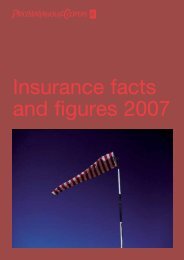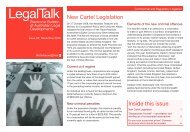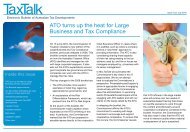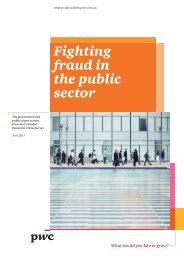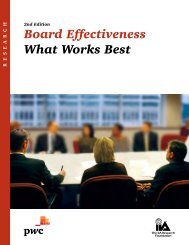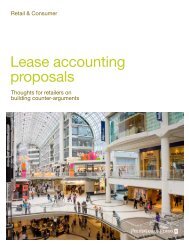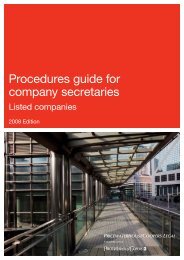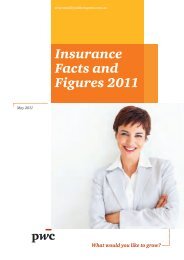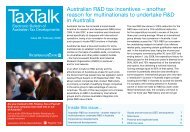Thin capitalisation: eroding asset values and increasing debt ... - PwC
Thin capitalisation: eroding asset values and increasing debt ... - PwC
Thin capitalisation: eroding asset values and increasing debt ... - PwC
You also want an ePaper? Increase the reach of your titles
YUMPU automatically turns print PDFs into web optimized ePapers that Google loves.
TaxTalk – Electronic Bulletin of Australian Tax Developments<br />
• BAS agents will not be required<br />
to demonstrate the same degree<br />
of formal education <strong>and</strong> relevant<br />
experience as ‘tax agents’. This<br />
reflects the narrower scope of<br />
services that they may provide.<br />
• In the case of partnerships <strong>and</strong><br />
companies seeking registration,<br />
compliance with the requirements<br />
will be demonstrated by sufficient<br />
organisational qualifications<br />
<strong>and</strong> experience.<br />
• Entities that specialise in a particular<br />
area of the taxation laws or that only<br />
provide a type of tax agent service<br />
(for example, tax compliance work or<br />
advice rather than both) will be eligible<br />
to register, with scope to operate in<br />
their specialty.<br />
• Because BAS agents are not currently<br />
regulated, a significant transitional<br />
period for their registration is proposed<br />
to allow sufficient time for applicants<br />
to meet the requirements.<br />
• Tax agents <strong>and</strong> BAS agents will<br />
be governed by a legislated Code<br />
of Professional Conduct. There<br />
will be a broad range of sanctions<br />
that the Board may impose for<br />
non‐compliance with the Code.<br />
• New civil penalty provisions (including<br />
substantial monetary penalties)<br />
will apply where the conduct being<br />
sanctioned is not serious enough<br />
to warrant a criminal conviction or<br />
imprisonment. Situations where<br />
these will apply include where a<br />
registered agent makes a false or<br />
misleading statement, employs or<br />
uses the services of an entity whose<br />
registration has been terminated due<br />
to misconduct, or signs a declaration<br />
in relation to a document prepared<br />
by an entity that is not qualified to<br />
prepare that document <strong>and</strong> was not<br />
appropriately supervised.<br />
• The Board may also apply to the<br />
Federal Court of Australia for an<br />
injunction to prevent or compel<br />
certain conduct.<br />
The Assistant Treasurer noted that a<br />
major direct benefit for taxpayers will be<br />
the introduction of two ‘safe harbours’<br />
for taxpayers who engage a tax agent<br />
or BAS agent. The safe harbours will<br />
exempt taxpayers from liability for an<br />
‘administrative penalty’ imposed by<br />
the Commissioner where:<br />
• having made a false <strong>and</strong> misleading<br />
statement to the Commissioner (which<br />
would result in an administrative<br />
penalty applying), the taxpayer can<br />
demonstrate that they had taken<br />
reasonable care by engaging a<br />
tax agent or BAS agent <strong>and</strong> gave<br />
all relevant taxation information<br />
to the agent<br />
• having failed to lodge a document on<br />
time <strong>and</strong> in the approved form (which<br />
failure would result in an administrative<br />
penalty), the taxpayer can show<br />
that they had engaged a tax agent<br />
or BAS agent <strong>and</strong> had provided all<br />
necessary information to the agent to<br />
enable them to provide the document<br />
to the Commissioner on time <strong>and</strong><br />
in the approved form, but the agent<br />
carelessly failed to do so.<br />
The safe harbours will not apply where<br />
either the taxpayer or the agent has<br />
intentionally disregarded a taxation law<br />
or been reckless as to the operation<br />
of a taxation law.<br />
Other revenue legislation<br />
Tax Laws Amendment (2008 Measures<br />
No 5) Bill 2008, introduced into the<br />
House of Representatives on 25<br />
September 2008, was referred to<br />
the Senate Economics Committee<br />
for review. In its final report, that<br />
Committee recommended that the<br />
Senate pass the Bill. The Bill proposes<br />
to make amendments to give effect to a<br />
number of taxation measures, namely:<br />
• amendments to the goods <strong>and</strong><br />
services tax (GST) law to maintain<br />
the integrity of the GST tax base by<br />
ensuring that the interaction between<br />
the ‘margin scheme’ provisions <strong>and</strong><br />
the ‘going concern’, ‘farml<strong>and</strong>’ <strong>and</strong><br />
‘associate’ provisions does not allow<br />
property sales to be structured in a<br />
way that results in GST not applying<br />
to the value added to real property<br />
on or after 1 July 2000 by an entity<br />
PricewaterhouseCoopers : 23



